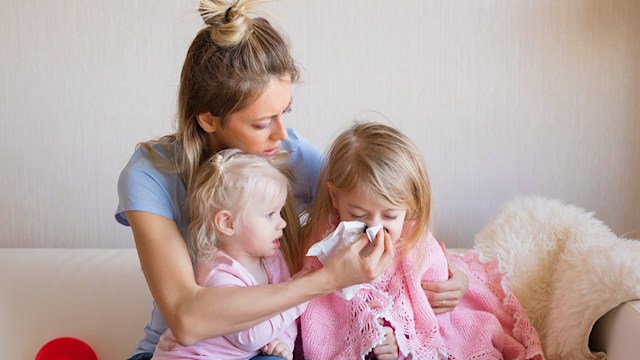As Coronavirus cases continue to spread throughout the world and the UK enters the 'delay' phase of tackling the virus, many of us are feeling concerned about the possibility of contracting the illness. While much has been written about adults and those with underlying health conditions falling ill with Coronavirus, not much has been said about its effects on children. Parents will be understandably worried about their children catching the virus, so we asked a GP to explain the risks of Coronavirus in children - what are the symptoms to look out for and when to seek medical help? Dr Tim Ubhi, consultant paediatrician and founder of The Children’s e-Hospital (an online resource for parents) shares his advice…
How can parents explain Coronavirus to their children?
Dr Tim Ubhi told HELLO!: "Parents can say that, 'Coronavirus is an infection that can give you a cough and a runny nose. It’s really important that we wash our hands regularly so that we don’t give the infection to anyone else. We will also need to drink plenty of water and sometimes take some medicine to make us feel better'."
Encourage your children to wash their hands regularly
How can parents encourage good hygiene with their children?
"Using a star chart or a reward system is a great way to encourage children to wash their hands. If a child comes into contact with someone who has flu-like symptoms, it’s good practice to get them to wash their hands straight away, otherwise, every one to two hours will help to reduce the transmission of germs. Essentially, the more you wash, the better it is."
MORE: 6 common causes of stress in children
Are Coronavirus symptoms different in children to adults?
"The data on children is limited but it so far suggests that children are not as severely affected as adults. As more information comes through we will get a better idea of how the disease affects children." He adds: "The data we have so far suggests that children are likely to have a mild infection, very similar to the common cold."
Are children at a higher or lower risk of contracting the virus than adults?
"At the moment there is no data to suggest that there is a difference in infection rates between children and adults."
A high temperature is one of the symptoms of the Coronavirus
What should parents do if their child is showing flu-like symptoms?
"The best thing to do is to ring NHS 111 who have a very clear triage process to identify at-risk patients. What you mustn’t do is to take your child to the GP or hospital (unless they are very unwell of course)."
What about children who have asthma or underlying health conditions?
"Children with underlying health problems may be more severely affected by this infection and each case will have to be reviewed on its own merits."
MORE: How the coronavirus could affect your wedding day
We've heard about 'mild symptoms of Coronavirus' - what does this involve?
"Mild symptoms’ refers to things like a cold, cough or mild fever, very similar to having a cold."
Call NHS 111 is your child displays flu-like symptoms
If a child does have Coronavirus, when should parents be concerned and contact a hospital?
"If your child is struggling to breathe or there are any concerning signs that may suggest sepsis, they should be dealt with straight away. The NHS 111 service will help direct you to the right treatment for your child.
"Having access to a thermometer at home, or the more advanced HOTPOD (endorsed by the UK Sepsis Trust), which monitors six vital signs in children including heart rate, oxygen levels and temperature – should also provide reassurance for parents."
NRS Healthcare Talkng Ear/ Forehead Thermometer, £29.24, Amazon
BUY NOW
Does Coronavirus cause sepsis?
"In around 2-3% of all adult patients, the coronavirus infection can cause death. These patients can appear to behave just like patients with sepsis. The data on mortality rates in children is limited but appears to be low."
